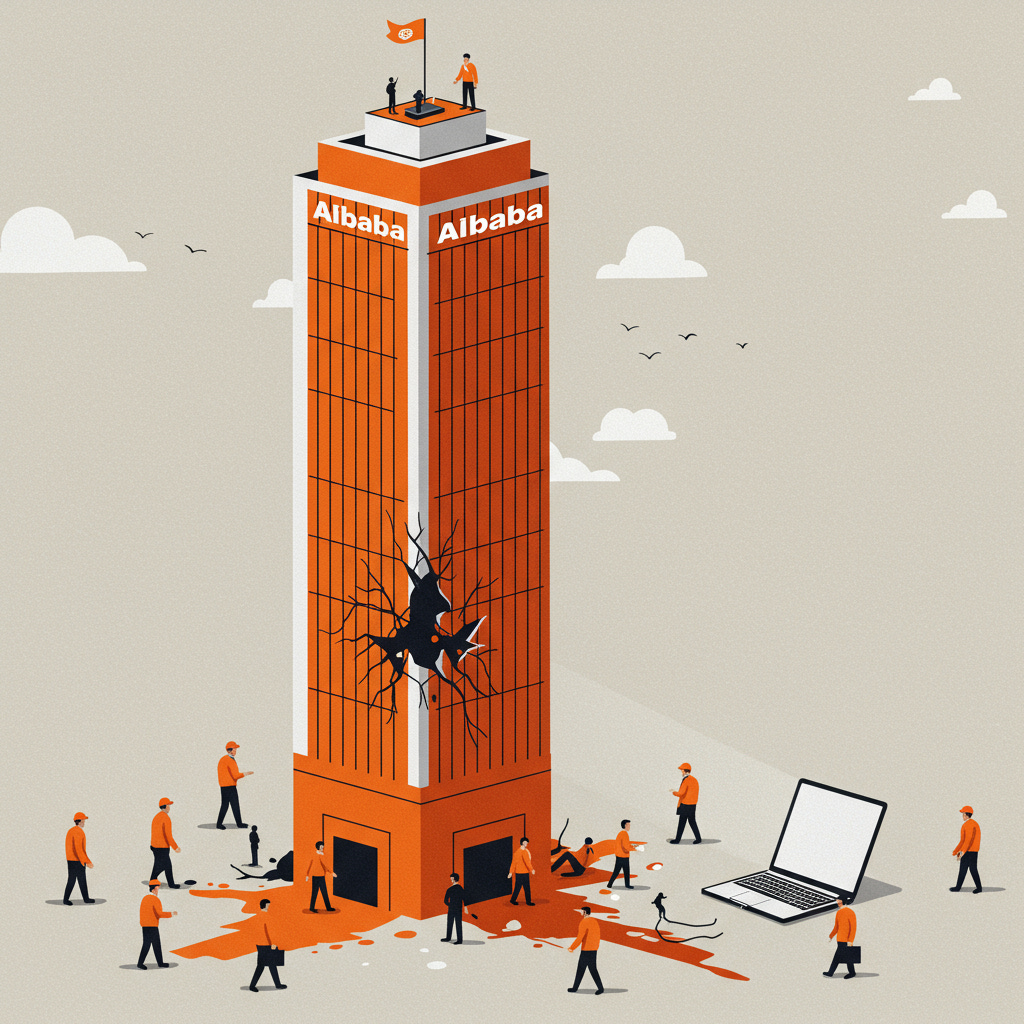Alibaba’s identity crisis spills into the open
A departing Alibaba executive’s viral memo exposes cultural decay, failed bets, and internal chaos as the company struggles to reinvent itself in the AI era.
Alibaba’s internal culture has shifted from mission-driven to KPI-obsessed, eroding employee motivation.
A departing R&D executive’s 10,000-word memo has sparked soul-searching and leadership responses.
Failed acquisitions and innovation bottlenecks reveal Alibaba’s deep strategic malaise.
Alibaba Group once epitomized China’s entrepreneurial rise. Founded in 1999 by Jack Ma, its mission to "make it easy to do business anywhere" powered its ascent into Asia's largest tech giant. But after two decades of expansion—from e-commerce to cloud, logistics to fintech—the company now finds itself at a crossroads.
The split of its empire into six units in 2023 was meant to rejuvenate growth. But behind that restructuring lies a deeper malaise: a company wrestling with its own identity. A rare, candid insider account has brought that struggle into sharp focus.
A viral farewell ignites an internal reckoning
In early June, a senior R&D executive known as Yuan An (alias), published a 10,000-character resignation essay on Alibaba’s internal network. He dissected the company’s cultural and strategic drift with unflinching clarity. The post exploded across Alibaba’s ranks—and eventually reached founder Jack Ma.
“Alibaba used to be about ideals,” Yuan wrote.
Now we talk about KPIs, stocks, mortgages. Customers are just data points to be harvested.
His words echoed a broader sentiment in China’s tech sector, where the dream of transforming society through technology is increasingly eclipsed by short-term metrics.
Jack Ma responded publicly: “Well written. Alibaba is changing. Come visit often.”
But Yuan’s letter was more than a nostalgic lament—it was a diagnostic report on corporate stagnation.
Failed bets and innovation droughts
According to Yuan, Alibaba’s bold acquisitions over the past decade have mostly flopped. He pointed to Kuaishou competitor UC, music platform Xiami, video giant Youku, bike-sharing, and even Southeast Asia’s Lazada. “With the exception of Amap (Gaode) and UC, most were failures,” he noted.
The reason: “Obsessed with operational data, allergic to long-term product polishing.”
Internally, only a few spinouts like DingTalk and Quark succeeded beyond Alibaba’s e-commerce core.
Independent innovation is rare, and attempts to build beyond retail rarely gain lasting traction. The missed opportunities—especially in mobile, short video, and social commerce—have cost the group relevance among China’s digital natives.
People problems: morale, merit, and mistrust
Yuan’s most stinging critique was on people.
He alleged a “talent inflation crisis,” where title promotions were used to retain staff amid shrinking opportunities. This created input-driven inflation—rewarding seniority over substance—and made promotions meaningless. “Too many are promoted not for results, but to keep them from leaving,” he said.
Alibaba’s famed culture—rooted in “Ali flavor” and founder-led energy—has been diluted by heavy hiring of external talent. Newcomers lack shared values.
Internal rivalries and performance-score manipulation have become rampant, raising collaboration costs. The once-clear path for doers has been replaced by what Yuan calls "politics-driven survival."
Promotions lack transparency. Performance is directly tied to pay, but assessments are hidden and managers wield wide discretion. “Good performers burn out, bad ones survive,” he wrote.
Bureaucracy and the illusion of control
Yuan’s narrative paints Alibaba as a machine mired in busywork. Strategy meetings abound, but decision-making is paralyzed.
He criticized the “reporting ritual”—where executives spend excessive time preparing data presentations that rarely yield decisive action.
Alibaba’s “big company disease,” a term even CEO Wu Yongming used in his 2024 shareholder letter, is not just symbolic. It’s structural.
Middle management is bloated, roles unclear, and product lines duplicative. The company excels at spinning a story of operational excellence but often falls short in execution.
The post-Ant era and mission drift
Many of Alibaba’s current challenges trace back to its post-2017 era. The crackdown on Ant Group in 2020 marked the beginning of a more risk-averse, compliance-heavy era. Internal boldness dried up.
Strategic clarity blurred. Yuan observed that “since 2017, energy has slowly drained away”.
He linked this to the fading of Alibaba’s once-powerful mission.
We’ve gone from changing the world to gaming the system,
He wrote. That loss of moral north star has made it harder to recruit and retain visionary talent—especially as ByteDance, PDD, and Meituan surge ahead.
Alibaba remains a behemoth. But as Yuan’s letter and Jack Ma’s reply reveal, the company is at an inflection point. AI may offer a path forward, but only if it fixes the rot within. The next chapter will hinge less on what Alibaba builds—and more on what it becomes.

